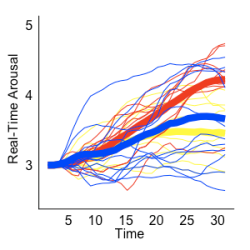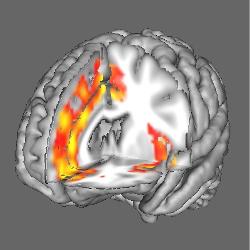The goal of Dr. MacDonald's Translational Research in Cognitive and Affective Mechanisms (TRiCAM) laboratory is to provide a deeper understanding of our everyday thought processes and of how those processes go awry in mental illness and addiction. The ultimate purpose of this research is to reduce suffering. To achieve this goal, the Translational Research in Cognitive and Affective Mechanisms (TRiCAM) laboratory uses methods from experimental psychology, clinical science, and neuroimaging to explore how thought and emotion work together in framing our experience of the world.
This approach is applied across three programs of psychosis research currently underway in the TRiCAM lab. Psychosis refers to a number of disturbing symptoms that can severely detract from people’s well-being.
- How do cognitive control impairments contribute to symptoms such as disorganized speech, confusion, and impaired attention? The TRiCAM laboratory leverages several experimental paradigms, neuroimaging methods, translational collaborations, and computational approaches to explore the role of prefrontal cortex, cognitive control, and state representations in cognitive control. These processes are key to using context and other information to ameliorate distressing symptoms.
- Why do some people feel persecuted? There are many reasons people feel targeted by others. What emotions are associated with social decisions such as whether to trust someone? The laboratory uses social decision-making tasks, neuroimaging, and behavioral genetic designs to examine patterns of brain activity and connectivity and to understand the circuitry that relates to these distressing and uncanny feelings.
- How can the brain heal itself? The laboratory has a long history of using experimental designs to understand neuroplasticity. Neuroplasticity is change at a neural level, which can be leveraged through lived experiences and learning. Can cognitive exercises elicit enough neuroplasticity to help patients overcome cognitive deficits? Can additional modalities, like transcranial direct current stimulation, help people realize their goals for cognitive change?
Psychosis is not the only form of psychopathology that we study in the TRiCAM laboratory. We also ask questions like if compulsive behaviors, such as drug addictions, are caused by failures of top down control or failures to process rewards adaptively? What personality characteristics and cognitive capacities characterize individuals who are increased risk for addictions or other self-defeating behaviors?
Our work is guided by an understanding that the burden of disease, and in particular some mental illnesses, is not distributed evenly across our communities. We strive to address the question: how can we incorporate our understanding of diversity, equity, and inclusion into the study of psychosis to help those who are most vulnerable?

